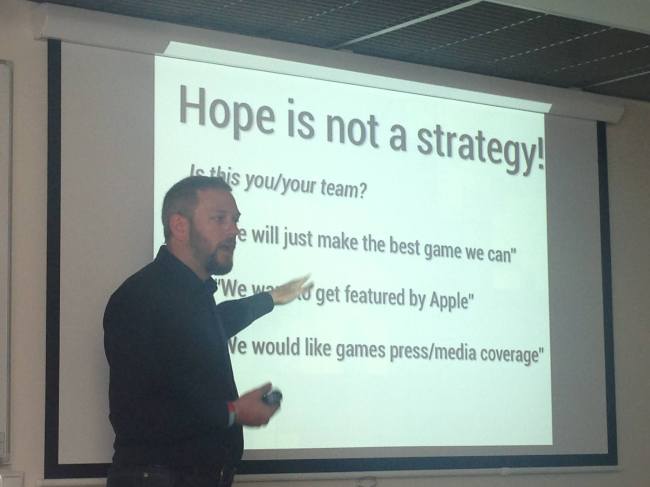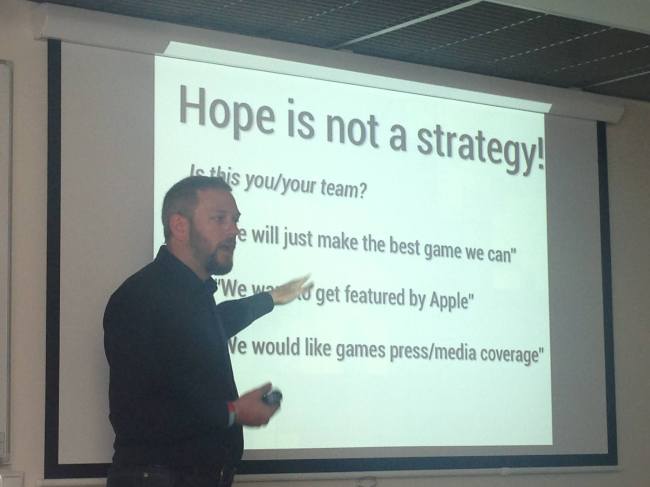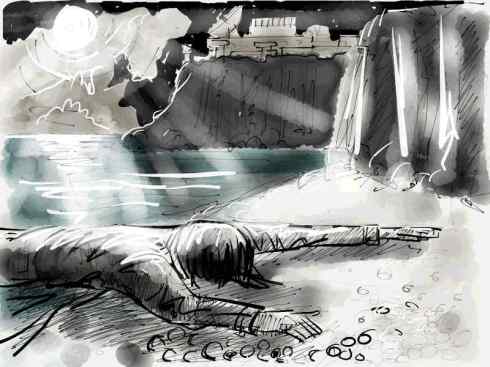


Delivered in Tallinn in March 2014 to games start-ups on the GameFounders accelerator programme by Kevin Corti (SpiderShedMedia/Evil27 Games as indie games guy) and Don Turner (Blackberry as mobile store guy) who are both visiting mentors to the programme.
Some (slightly) random notes I took from attending Games Monetization Europe earlier this week. I’d recommend this event for it’s currency of content and the quality of people attending.
http://www.videogamesintelligence.com/monetisation-europe/
(#GMEU on Twitter)
===================
Nick Parker
- Games market – Asia 56% of revenue, EU17% US21%
- Data at IHA Screen Digest
- iOS delivers stronger revenues because of store fragmentation – 40 android app stores, many different handsets, piracy
- Comparing publisher net revenues, 20% console, 49% online
- 1.7bn connected TVs by 2016 in 570m homes
- 2.4bn smartphones, 550m tablets by 2016 = 3bn devices
Peter Edward, SME Director, PShome
- 150 devs providing content
- F2P is viable on consoles
- audiences are similar on console and other f2p platforms
- can be for smaller devs/teams not just large teams
- hungry community, like innovation, all like games, like personalisation and customisation, comfortable with micro transactions, infrastructure exists
- Home and f2p – engine, tool sets and samples, infrastructure is free, trusted commerce system (PS Wallet), numerous opportunities to buy (places)
- cheap entry to console Dev, predictable ROI
- curated content…discovery ‘easy’
PANEL all you can eat or micro-transactions
- 380m registered users – Gamesforge
- 42m MAU CandyCrush Saga
Game design workshop
Game pyramid:
- Core loop (find the fun)
- Retention game (what keeps the player coming back to the core loop)
- Super Fan game (strong social levels that work for the super fan/spender)
King – Tommy Palm
- Use King.com to test game ideas first
- Marketing & branding….
- Cross marketing is very important – PR, word of mouth, Facebook traffic, getting featured, ads, cross-promotion
- You need 150,000 downloads to get on top of iOS chart
- Over 50% of users connected to FB
- USE DEEP LINKING…notifications include link to App Store, can include parameters to enable game-specific functionality
- Notification,s timeline, news feed and bookmarks + paid ads = drive new installs
Fiksu
- Facebook users – 75% of MAU is (also) on mobile, 10% solely mobile
- Mobile app install unit, deep link to app but seamless as can return straight back to FB as opposed to sponsored stories that take user off to any URL
- 600×360 creative, <10% of screen space can be text
- Highly targeted
Global monetization of games – Newzoo
===========================
- $70bn overall games industry
- Latin America and Asia main growth
- Europe and us relatively flat
- 1.23bn gamers this year
- 18% of market is mobile inc tablet
- Gaming growth:
- 32 TV +4% growth YoY
- 77 floating screen + 5% growth YoY
- 39 computer screen + 5% growth YoY
- 12 personal screen +22% growth YoY
- 87% increase on tablet gamers in UK YoY,
- 20% play on all screen types
- 40% of all smartphones players pay money (UK)
- Russia spends more on iPad games thanGermany
WOOGA – Al Sinoy, PM for Diamond Dash
- Make first play super accessible
- avoid unclear controls, unnecessary UI, loading screens,
- instant rewards, unlock new levels, unlock new elements, free stuff
- breathing spaces…avoid burning through content very quickly…don’t let them get everything at once but show what can be won/played etc
- provide milestones, e.g. reset high scores weekly
- push notifications e.g. Energy recharged, stuff unlocked, high score reset
- Community management and follow up feedback
- Ensure cross-platform communication
- Beware of aggressive monetization – payers should get empowering value, but still need to satisfy non-payers
- Reward non-paying/time-rich players as much as paying users
================================================================
Kevin Corti, SpiderShed Media
[Mobile/social games design, project/product management & commercialisation]
Linkedin: www.linkedin.com/in/kevincorti
Twitter: @spidershed
So here I am; 6 weeks into being ‘Mr Evil 27 Games Limited’.
I have to confess; being a one-person indie games development studio is almost as unnerving as it is exciting but then I do have “Wisdom Comes To Those That Stray” on my arm and I know from experience that trying something unconventional in your professional life doesn’t always end in ‘success’ but it does always end in useful experience and learning.
I’ve founded/co-founded three previous games/digital start-ups over the last 15 years and in a way they were all ‘indies’ in that we were largely in control of our own destiny (within fiscal limits of course) and developed our own games/tech/services which we then choose how we would commercialize. This time it is different though. This time I am (currently) alone, adopting my own commercial strategy, working on my own game concepts, designing 100% of the game mechanics and UI, defining the business model and IAP items/prices, cutting my own code, doing my own concept art and at the same time doing the bulk of the business admin, networking and social media marketing.
All of that take some hours! I’ve always worked long hours (typically 50 or so hours a week with SoshiGames and PIXELearning) but I’ve found myself largely in my office from just after 8am to gone midnight most days now. The interesting thing is that this doesn’t in anyway feel onerous, in fact I feel more energized and upbeat than at pretty much anytime in the last decade. I don’t think that is unique and in fact I think this is the very reason that so many games professionals opt for and embrace the indie route as an alternative to taking a ‘sensible’ role at an established studio. ‘Indie’ = creative/professional freedom. It shares much with the punk ethic; I’m sticking to what I believe in, my values and ideal irrespective of what ‘the system’ or convention may dictate.
That ‘freedom’ comes with costs; the aforementioned hours, lower/sporadic income, uncertain outcomes/risk etc, and it does not (read: ‘should not’!) equate to “I’m doing this so I can sit in my bedroom pretending to work making games that only I want to play”. Going indie needs to be approached in a considered, researched and professional manner. You may want to focus on bringing your ideas to reality but nonetheless you need to put time and effort into the commercial aspects of your business. You need to be prepared to do (or find someone who can do) the accounts and other business admin (deal with Companies House, HMRC etc), craft and execute a commercial strategy (what are you selling to who for how much and how?) and you need to force yourself out of your ‘pit’ to go network often.
I come into contact with a lot of young/small games, digital media and technology start-ups, many of whom are founded/staffed by raw graduates. Many mistakes will be made (I’m sure I’ve made them all and will make many more myself) but you can reduce the number of and impact of these mistakes if you are sensible. Here’s a few I would recommend for indie games start-ups:
Have a clear focus: Here’s mine; EVIL27 Games will develop it’s own games for a casual-core audience that are optimized for tablet devices and which (ultimately) enable players to create, share and recommend user-generated content through social networks. Having a focus doesn’t mean you have to plan to do one thing and one thing only. It’s about knowing what your end goal is, how you plan to reach it and also knowing what you won’t be doing.
Get the balance right: I’m not talking about ‘work-life balance’ (not that this isn’t important!) but rather the balance between the competing draws on your time by the needs of the business and the product (e.g. your game). You may be thinking “we’re nothing without a game”, and in a sense you are right of course, but you won’t get to finish that game and achieve your commercial goals, whatever they may be, without creating a sound foundation for the business. That means managing the cash (and acquiring it), it means filing all the regulatory information on time and it means making sure that there is indeed a ‘business’ at all, not just you and a bunch of friends having fun making games. It’s hard to stay on track with the game development if you are constantly distracted by other things so I personally have adopted a ‘week on/week off’ approach where I spend one week doing all the business admin, sales, finance, marketing, networking etc in order to earn the right to spend a week doing nothing but making the game. If you are professional, organised and manage your time well you may find that the business side only needs maybe 2-3 days – you just earned a few days bonus! Level up!
Set achievable goals: don’t go into this expecting or even hoping that you will create the next App Store or STEAM sensation. If that does happen then you were most probably very lucky (as well as very good!). If you plan for that ultra-big success outcome, you will almost certainly fail. Instead make sure that you have achievable goals on a practical timescale and that you have the financial resources/income to control that. To illustrate this here’s my 2013 goals:
- Build & release game 1 (a 2D iOS/Android puzzle game ). Commercial goals: get company known, master app development and submission process plus learn how to get the best out of 3rd party advertising and promotion services. Hopefully: start building a player community. Will it have ways to derive revenue? Of course. Do I plan for any revenue? No.
- Build & release game #2 (a point & click adventure game with a novel approach to freemium). Commercial goals: get to meaningful revenue generation e.g. it pays some of the (still carefully managed) bills, further enhances the company’s reputation/awareness and increases the contactable player base/community.
- Have commenced development on game#3 (a RTS game with a mobile-friendly approach to ‘modding’ as a central feature): Commercial goals: Position the company with a clear USP (‘mobile modding) and market positioning (mid-core/tablet devices), be on course to hit cashflow and revenue forecasts for year 2.
Network often: I’m not a natural networker. I’m not shy as such but I’m not at my most comfortable in crowds with strangers at professional/commercial events. Does that sound like you? Time to get over it! Force yourself to find and go to industry and related events on a frequent basis. I recommend seeing what events TIGA/UKIE are doing, looking ahead to games conferences (see www.games.confs.com), checking out local university/science park events and general digital, technology exhibitions. Birmingham Science Park Aston, for example, regularly run games and technology events. They are usually free or very cheap. Also, do regular searches on Eventbrite.com and Meetup.com – search for ‘games’ etc and see what comes up. Go along able to say clearly what you are doing, what your company/game is about and why you are doing it. Maybe think about things you may need (concept art, audio, help with QA etc?). I personally aim to go to at least one event per week. If there aren’t any formal events scheduled, then maybe try to arrange to get out and meet another company or game developer. Share ideas. See what they think about what you are doing. See if you can help each other. What goes around comes around, especially in the insular games industry!
Frequent sense-checks: take (regular) time to sit back and examine what you have done and what you are planning to do. A good game needs constant re-visiting, testing, optimizing and, most likely, 90% of the ideas thrown out. So does a business. It’s about refinement; finding what works on perfecting that essence. A game that is packed with every feature you can think of is most likely a bad game. A new/young business that tries to do everything for all people is most likely doomed to failure. You may be one person at home with a PC but if you say you are an indie game developer then you are also a business and you need to accept and embrace that. A business doesn’t make a product or service that there isn’t a decent chance that someone will pay money for. You may not be able to guarantee that but you had better be bloody sure that you have done everything you can to maximize the likelihood of that happening.
Your motivation to ‘go Indie’ may be to make the games you want to make because, ultimately, that is what you enjoy but that doesn’t release you from the reality that you need to do the ‘business stuff’ as well. Being professional is not about ‘selling out’. Look at it this way, even if you hate that aspect, doing it (well) earns you the right to make your game….and the one after that!
Kevin Corti
‘Chief Evil Officer
@kevcorti / @evil27games


